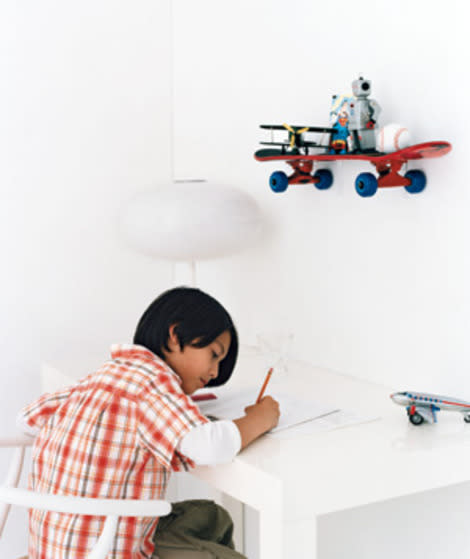When Parents Should Get Involved in Kids' Issues
Expert advice on 7 common situations, so you'll know when to meddle and when to stay mum.
By Katie McElveen

1. Your child has an unreasonable amount of homework.
Should you butt in? Not until you've done some serious reconnaissance work. "Make sure your child is legitimately spending time working," not playing with the dog or daydreaming, says Jan Busey, an elementary-school teacher for nine years in Asheville, North Carolina. If that's not the case, make an appointment with the teacher.
How to handle it: Come prepared. Before the meeting, keep track of your child's progress. "Set goals for your child to complete an assignment, then assess at the end of that time," says Busey. "And write down specific challenges. The more you can show that you've tried to deal with the issue at home, the more receptive a teacher will be to your concerns."
When to reconsider: If your help in organizing tasks seems to speed things up and ease stress, the answer may be structure, not a teacher conference.
Also See: Help With Common Homework Problems
2. Another adult lectures your child.
Should you butt in? If the conversation is an attempt to keep your child safe (he's climbing up the slide the wrong way), let the other parent finish.
How to handle it: Be present and reinforce what the parent was saying so your child understands that it's not OK with you, either. "Stopping others from disciplining your child lets him think he can behave badly when out of your sight," says etiquette authority Jodi R. R. Smith.
When to reconsider: If the adult is speaking to your child more strongly than is necessary, you can politely cut him off. "Introduce yourself as the parent, then say that you'll take it from there," says Stacy DeBroff, author of The Mom Book (Free Press, $21, amazon.com).
Also See: How to Handle Changes in Your Child's Behavior
3. Your child didn't get invited to a big birthday party.
Should you butt in? No. Making an issue about the slight will probably make things worse and draw attention to the fact that your child was left out.
How to handle it: Instead, focus on comforting your child and planning something fun as a diversion on the big day. Down the road, if this happens more than once, consider enrolling your child in a class or a program outside of school. "He'll meet a new group of kids who share his interests," says Michele Borba, an educational psychologist in Palm Springs, California, and the author of The Big Book of Parenting Solutions (Jossey-Bass, $20, amazon.com).
When to reconsider: You may want to talk to the teacher―not the other child's parent―to make sure there's not a larger issue between your child and the birthday boy. "Ask if there is some tension between this child and yours," says DeBroff. "If you find out that your child did do something mean, use this opportunity to show how his actions affect others."
Also See:Etiquette Guide to Kids' Birthday Parties
Read About More Ways to Handle Your Kids' Issues
You Might Also Like:
How to Find the Right Babysitter
How to Joke Around With Kids
10 Signs Your Kids Are Overscheduled
